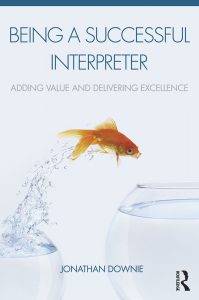The following is taken, without permission, from Chapter 3 of the excellent Being a Successful Interpreter by Jonathan Downie. It is an interview between the author and Elisabet Tiselius, a leading researcher in interpreting expertise and practice. Please go and buy the whole thing that I might be forgiven for using this extract here!
Can Professionals develop?
Often students leave their initial training thinking that they have learned all they need to learn. How can we counteract that thinking?
We can counteract that in the way we train the students. Athletes and musicians learn that unless they practice they will not be able to pursue their career; they learn it both from their teachers and coaches, and the hard way. Researchers are taught that unless they continue their research they will quickly be sidestepped. But, when 1 try to analyse what we do as interpreting teachers, I have the impression that students are told to practice but not taught to practice. ,Learning to practice must be part of the curriculum. furthermore, students are not taught lifelong learning. Lifelong learning is a buzzword now, and for most interpreters it has always been a reality when it comes to keeping up with current affairs, learning new topics, or new languages. But I have the impression that this is not true when it comes to the components that build up our main skill (voice, intonation, transfer, pace, and so forth).
Some people in the field of interpreting have started to argue that continued professional development is so important that it should be seen as a necessary part of being a practising interpreter. Would you be happy for it to be seen this way?
Mostly yes. Many professional associations (e.g. American Translators Association; ATA) have requirements to fulfil a certain amount of CPD points every year,,and many of them also organize CPD. I like that, but if you are not part of a professional association, which will then control the CPD, our clients will most likely not look at our CPD portfolio. Universities and interpreting programs could play a more important role here though, and organize shorter courses for active interpreters. And finally, I think that the benefits of CPD are also something we need to teach.
If you were advising new interpreters to choose specific areas to target for their growth, which ones would you choose and why?
I will not go into marketing, negotiation, and other business-related areas, which are also vital for new interpreters, such as the following:
1 Voice training —Actors take voice classes or work with voice coaches. I don’t understand why teachers and interpreters and other ‘voice professions’ don’t. Interpreting programs give voice training, but again, it seems to beperceived you know it. as a one-off phenomenon, and once you’ve finished your program you think you know it.
2 Presentation skills – “Interpreting is about presentation, and your presentation skills can always be improved. And, the better you are at presentations, the better you can follow the speaker, too. You can learn’ master different types of presentations when it comes to both topic and style (Pecha Kucha, just to mention one).
3 Working with a mentor or coach – You may not agree with me, but I don’t think interpreters are very good at mentorship or coaching. And most feed-back is based on you missed this word or that argument. But good mentors or good coaches can do so much more. Obviously, you don’t have to work with a coach every day or week, but on a regular basis would probably be beneficial. Again think actors or musicians.
Which growth areas do you think more experienced interpreters might need to target and why?
As a matter of fact, I think that the points above go for interpreters of all levels of experience. I think it should be part of the lifelong learning.
I argue in this chapter that often it can be difficult for interpreters to admit their weaknesses and get help. How would you suggest we overcome this tendency?
The million-euro question. Unfortunately, the world of interpreting is not necessarily a warm, open, generous world. We are all competitors for the same assignments. Furthermore, unless you are convinced that you are right (and sometimes also outstanding), you cannot convince your listener. These two factors together make it difficult for interpreters to admit weaknesses and work on them. Once again, I believe in the new generations and the training we give them. I believe in the community of practice approach, something I try to establish at my university, and which Danielle D’ Hayer is working with too, and doing research on for interpreters, and which has been launched as a digital initiative by eCPD6, too. But training programs can also help here; so far I have not heard of brush-up courses (only focusing on technique) for active interpreters.
